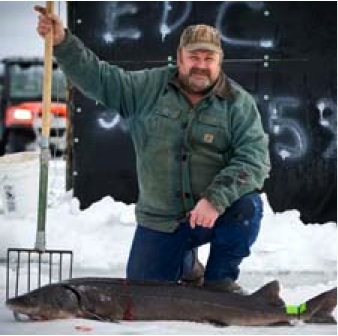
The 2013 Black Lake Shivaree. Photo: Mark Chimner
Michigan’s Black Lake winter sturgeon season ended Monday when the last of a 6-fish quota allowed this year was speared.
The season started at 8 a.m. Saturday and would have ended no later than Wednesday if the quota was not filled. Three fish were landed on Saturday, one Sunday and two on Monday.
Husband and wife Gil and Brenda Archambo have a long history of fishing for and preserving lake sturgeon. Both work for Sturgeon for Tomorrow, a non-profit organization devoted to the conservation of a fish that can live more than 70 years and grow to be more than six feet long.
This year, Claudia Wright speared the largest sturgeon at 66 inches and 67 pounds, according to the Michigan Department of Natural Resources.
Brenda Archambo, president of Sturgeon for Tomorrow, still remembers the first time she saw a lake sturgeon.
“I was about six when I first saw my first sturgeon,” she said. “(My grandfather and I) were out there in a shanty one day and there was a commotion going on and we went over and there was this big fish on the ice and it was very iconic.
“I never forgot looking into the eye of the sturgeon. It reminded me of pictures I had seen of dinosaurs.”
In Michigan, lake sturgeon can also be found in Burt and Mullet lakes in Cheboygan, but fishing is not allowed in those lakes because the species is scarce, according to the Michigan Department of Natural Resources, which determines how many fish can be caught each year.

A sturgeon speared during 2012 season. Photo: Michigan Department of Natural Resources
The department set a Black Lake harvest rate of 1.2 percent of the sturgeon population this year.
Gil Archambo, a director at Sturgeon for Tomorrow, enjoys the camaraderie the people bring each year to the shivaree, a celebration that coincides with the season.
“It’s like your hunting buddies that would go to hunting camp with you only on a lot larger scale,” he said.
It was a unique experience when at the age of 13 he caught his first sturgeon, he said.
Though the Archambos have great memories of lake sturgeon over the years, they have negative ones as well because the fish is threatened.
In the 1950s and 1960s, poaching was common in Black Lake and around the state, Gil Archambo said. “There were poachers that took actual truckloads of them.”
In the late 1990s, the state was going to shut the fishery down because of the poaching, said Tim Cwalinksi, a biologist with the conservation agency. But the Black Lake community wanted improved management.
“The people who were telling us that we need to do something also said don’t close the fishery.”
As a result, what used to be a month-long fishing season in the winter is now a four-day maximum season.
The shivaree is not all about fishing. Last weekend’s event was scheduled for two days regardless if the season ended in one day or four.
Activities included an open bar, a food court, Native American drum ceremony performed by Ottawa Indians and games for children at the former Black Lake Hotel, according to the Sturgeon for Tomorrow website.
